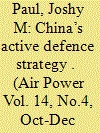|
|
|
Sort Order |
|
|
|
Items / Page
|
|
|
|
|
|
|
| Srl | Item |
| 1 |
ID:
161504


|
|
|
|
|
| Summary/Abstract |
Chinese President Xi Jinping has touted an Asian security architecture in which “it is for the people of Asia to run the affairs of Asia.” But does China really want to exclude the United States from the regional order? This article argues that previous answers are often insufficient because they do not account for sub-regional variation in China’s strategy. In maritime Asia, China seeks a significantly reduced role for the US and its alliances though major constraints limit the prospects for success. In continental Asia, however, the situation is more nuanced, with Beijing alternately ignoring, supporting, or hedging against US presence. The policy implication is that Washington should not overstate Beijing’s role as either a regional adversary or a regional partner. Rather, the United States needs to approach China on its own terms across sub-regions.
|
|
|
|
|
|
|
|
|
|
|
|
|
|
|
|
| 2 |
ID:
170613


|
|
|
| 3 |
ID:
189446


|
|
|
|
|
| Summary/Abstract |
Over the past eight years, Beijing drastically furthered its interests with the China-Pakistan Economic Corridor (CPEC) while reducing terrorism threats from AfPak-based groups. All this despite the repression of Muslim minority Uyghurs in the Pakistan-bordering Xinjiang region. What has been China’s security strategy in Pakistan? What lessons are there for the United States? Drawing on fieldwork in China and Pakistan, as well as interviews with Chinese, Pakistani, and US officials, journalists, and local experts, this article shows that Beijing’s security strategy in Pakistan rests on four pillars: (1) military invisibility; (2) economic visibility; (3) indiscriminate diplomacy, and (4) geopolitical alignment. This is the opposite of what has been Washington’s approach, which can be characterized as militarily visible, economically invisible, diplomatically selective, and generally at odds with Pakistan’s regional interests.
|
|
|
|
|
|
|
|
|
|
|
|
|
|
|
|
| 4 |
ID:
145548


|
|
|
|
|
| Summary/Abstract |
China has frequently been depicted by some observers as an assertive rising power. However, assertiveness is neither a theoretically rigorous nor empirically useful term. The ‘assertive China’ thesis also makes a somewhat partial argument for China’s external behaviour by primarily focusing its responses on territorial disputes. A closer examination of China’s regional security strategy reveals that it is shifting from comprehensive reassurance to conditional reassurance, combined with active coercion towards specific target states. Overall, China’s strategic transition has occurred amid profound international and regional environmental changes. In particular, the rise of China has shifted the regional balance of power in China’s favour, the United States has strengthened its strategic involvement in the region, and neighbouring countries have developed substantial concerns about China’s role there. Owing to these external and internal variations, China has been more inclined in recent years to use its coercive power to persuade neighbouring countries or to ensure that they indeed treat it with respect, yet it still pursues a strategy of general reassurance to defend its rise.
|
|
|
|
|
|
|
|
|
|
|
|
|
|
|
|
|
|
|
|
|